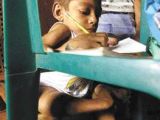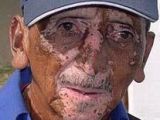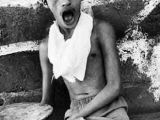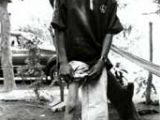Nemagon is the commercial name of the DBCP (dibromo chloropropane), developed and fabricated by some multinational chemical corporation.
DBCP appeared in the labs of the Dow Chemical Company and Shell Chemical Company. It was employed in the banana fiefs belonging to the multinational fruit companies to combat the nematode worms attacking the banana trees beginning with the end of the 60's, despite the lab probes that warned about its toxicity.
In lab rats it induced retarded growth, reduced testicles, and major lesions on the lungs and kidneys.
But contacts between both companies silenced the evidence. Manipulated medical reports permitted DBCP's approval by the Food and Drugs Agency (FDA) of the US as without "excessive risk".
In 1969, Standard Fruit Company started its use in its banana plantations in Central America. There was no warning about the pesticide's toxicity and the workers did not receive protection equipment. Over the years, thousands of liters of Nemagon were employed in plantations in Nicaragua, Costa Rica, Panama, Ecuador, Guatemala, Dominican Republic, Santa Lucia, Saint Vincent, Burkina Faso, Ivory Coast and Philippines.
In 1975, the Environmental Protection Agency in US determined that DBCP was carcinogen (cancer-inducing). In 1977, 35 workers out of 114 making the product in a US factory were sterile. That year, its use in the US was stopped and its delivery ceased temporarily.
But Standard threatened with breach of contract, and Dow continued its delivery only when Standard assumed the cost of possible damages.
In 1979, DBCP was forbidden in Costa Rica, and Standard transferred its stocks to the neighboring Nicaragua. And in 2000, DBCP was still employed in Panama, 23 years after its prohibition in the US.
65,000 persons are supposed to have been affected by Nemagon all over the world. This while 67 % of the banana workers in Nicaragua are sterile or suffer of some DBCP-induced disease. 33 % of the women working in the banana plantations have uterus or breast cancer, while the average value in the rest of the population in poor countries is 1%.
DBCP is now recognized as one of the most powerful cancer inducing products, even in low doses. Other induced cancers are those of testicle, stomach kidney and duoden.
Other consequences of the DBCP are mental deficiencies, genetic malformations, still birth, spontaneous abortion, bone deformation, brittle bones, general pains (especially muscle and bones), muscle atrophy, eyesight loss, diabetes, weight loss, hair loss, teeth loss, skin spots lacking pigment, hormonal disturbances, menstruation alterations, tiresome, paralysis, insomnia, liver and spleen inflammation, diarrhea.
But the psychological and social consequences are equally tough: self-esteem loss, impotence, severe depression, sadness and confusion, translated in job loss, alcoholism and suicide. Many men were abandoned by their wives as they could not have children. Others appealed to other men to let their women pregnant, all of this resulting in matrimonial unbalances and separations.
The judiciary history of this insecticide in countries like Nicaragua, Costa Rica and Honduras started at the beginning of the 90's. In 1997, 20,000 affected workers were convinced by their own lawyers and some politicians to receive a miserable severance pay of about $100, giving up future indemnities.
Now, only those who did not take the bait can ask for higher compensations. Manifestations and strikes came with no final result. The sued multinationals in Nicaragua are Dow Agro Sciences, Aka del Monte Fruits, Del Monte Tropical Fruits, Shell Oil Company, Occidental Chemical Corporation, Standard Fruit Company, Dole Food Corporation Inc., Chiquita Brands International and Del Monte Foods.
But the legislation lack in these countries makes these cases very difficult to judge. Only Costa Rica approved a law by which the affected ones receive state compensations. 4,000 victims of Nicaragua received about 4,800 million dollars due to the intervention of the Justice Department of the US on 7 multinationals.
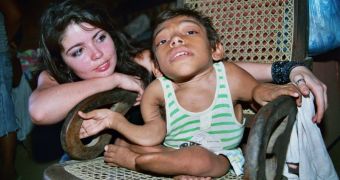
 14 DAY TRIAL //
14 DAY TRIAL // 
